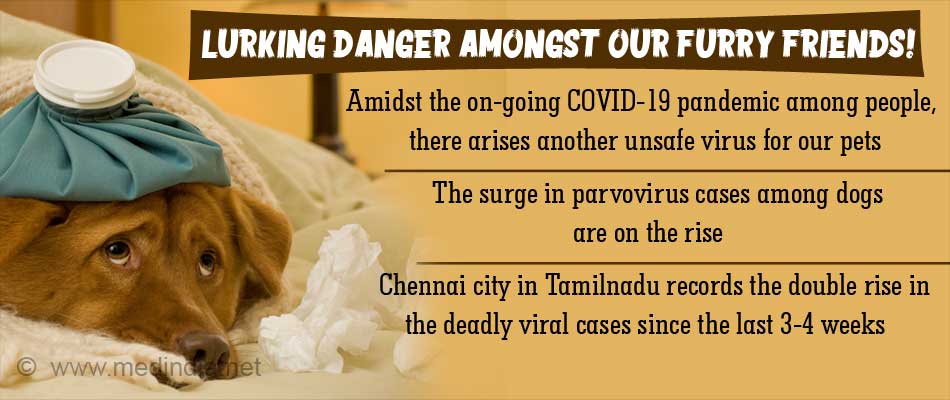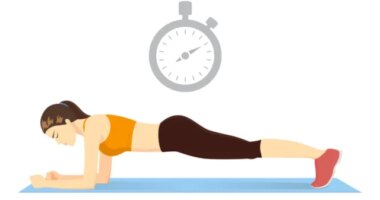
The veterinarians consider the reason for the trigger might be due to the rain.
(also known as CPV, CPV2, or parvo) is a type of virus that especially affects dogs.
in Latin. The canine parvovirus belongs to the genus
‘The surge in parvovirus infection among dogs combines a sneaking danger amid our pets as the cases nearly doubled in Chennai for the last 3-4 weeks.’
Read More..
The parvovirus is a highly contagious virus that can spread both directly through contact with the infected dogs and indirectly through the fecal-oral route. Symptoms like fatigue, vomiting, fever, or low body temperature (hypothermia), and bloody diarrhea are commonly seen among the positively tested dogs.
At least 250 cases of the virus were witnessed daily compared to May and June, when the number would only add up to 130 as per S Balasubramanium, the director university’s director of clinics. The director also added that most pet owners had delayed the vaccination for their pets during the pandemic.
And this could be one of the reasons for this rapid rush of the virus. It is seen that vaccination among dogs generally helps beat the virus. However, in cases where there is no treatment initiated, mortality can occur in 91% of cases.
Existing Evidence
A study in 2019 shows that about 74% of the dogs were infected with the virus after testing fecal samples of dogs. The figure rose to 84% in June and July and between 76-80% from November to January.
The rapid increase in parvovirus cases has been reported to be nearly doubled in the city over the last three-four weeks. The virus is capable of survival in the ground soil for up to a year. Hence the risk of getting infected even when the dogs play toils is high.
READ RELATED: Researchers uncover MORE evidence that smokers may be protected from the deadly coronavirus
Surge in Parvovirus
Dogs below 50 days of age are found to be more vulnerable to the infection. The abrupt rises of the viral cases are reported due to the start of the rainy season, as the contaminated water and soil may act as a carrier that could indirectly affect the healthy dogs.
So every time the dog sniffs, licks, or consumes infected feces, it is exhibited to the parvovirus.
Since the street dogs live in packs, even a single infected dog may spread it almost exponentially to many who contact it. However, it is also noticed that the dogs that were already infected by the virus, don’t habitually relapse.
How to Prevent?
Vaccination is the proven method of keeping the virus at par with our pets. Generally, the dogs are advised to be vaccinated against the virus at the sixth week and three booster doses at three-week intervals (that is, at 6, 8, and 12 weeks of age), for better protection.
An additional dose of canine parvovirus between 14 and 16 weeks of age is also recommended for adequate protection, regardless of earlier doses. It is therefore considered for the pet owners to have precautionary steps for their pups, especially when taking them for a walk until they are fully protected by the vaccine.
Nevertheless, the experts also note that even vaccinated dogs may have some chances of getting re-infected. This mandates the need to look out for warning signs for the viral infection.
The Initiative for the Pups A series of free vaccination drives have been launched against the virus by the Besant Memorial Animal Dispensary (BMAD) at Besant Nagar for nearly 500 pups and three other viral infections.
The drive trails from July 21 to July 25 for street puppies intending to vaccinate at least 100 stray puppies (less than 60 days old) on a daily basis.
“Vaccination gives dogs the immunity to fight the virus but since they may be carriers of the virus, any unvaccinated dog that comes in contact with them can contract the virus. This is why we have also stressed on getting dogs vaccinated at the right time,” says Dr. R Sooraj Mohan, senior veterinarian at Besant Memorial Animal Dispensary (BMAD).
Facts on Parvovirus
- Unvaccinated dogs younger than four months old have a greater risk for parvovirus infection
- The virus initially invades the gastrointestinal tracts of the dogs
- The virus manifests resistance to heat, cold, humidity, and drying
- It is competent of surviving for long periods in the environment and hence readily transmissible
- The deadly virus can end in death within 48 to 72 hours after the onset
- There is no medication to treat the virus
- Vaccination and early treatment measures may save the lives of the pups by 90%
References:
- What Every Puppy Owner Needs to Know About Parvo in Puppies – (https://www.akc.org/expert-advice/health/what-every-puppy-owner-needs-to-know-about-parvo-in-puppies/)
- Canine parvovirus – (https://en.wikipedia.org/wiki/Canine_parvovirus)
- Canine parvovirus – (https://www.avma.org/resources-tools/pet-owners/petcare/canine-parvovirus)
- Canine Parvovirus: Current Perspective – (https://www.ncbi.nlm.nih.gov/pmc/articles/PMC3550768/)
Source: Medindia
Source:










